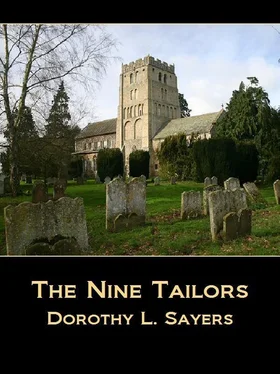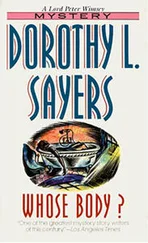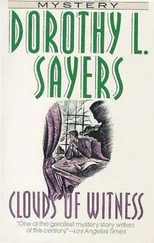“Surely not.”
“Well, you never know. He’s not pricking a peal, he’s only making a cipher and he might do something unusual on purpose.”
His pencil traced the letters again. “No. I can’t make anything of it. Wash out Grandsires. And I think we can probably wash out Stedman’s, too — that would keep the significants too close together. Try Kent Treble Bob, and we’ll take Tailor Paul first, since the Tenor is the usual observation bell for that method. She starts in the 7th place, H. Then 8th place, E. Back to 7th, S; to 6ths, I; to 4ths, T. ‘HESIT.’ Well, it’s pronounceable, at any rate. Dodge up into 6ths place, T again. Down to 5ths, E; to 4ths, T; to 3rds, H. ‘HESITTETH.’ Hullo, Padre! we’ve got two words, anyhow. ‘He sitteth.’ Perhaps ‘He’ is the necklace. We’ll carry on with this.”
The Rector, his glasses sliding down his long nose with excitement, pored over the paper as the pencil made its rapid way down the letters.
“‘He sitteth between’—it’s part of a verse from Psalm xcix — there, what did I tell you? ‘He sitteth between the Cherubims.’ Now, what can that mean? Oh, dear! there is some mistake — the next letter should be a B—‘be the earth never so unquiet.’”
“Well, it isn’t a B; it’s another T. There isn’t a B anywhere. Wait a moment. THE is coming — no, THEI — no, as you were. It’s THE ISLES. I can’t help it. Padre. It couldn’t come like that by accident. Just a second, and we’ll have it all sorted out and then you can say what you like…. Oy! what’s happened here at the end? Oh, dash it! I was forgetting. This must be the end of the lead. Yes”—he calculated rapidly—“it is, and we’ve got to make the 3rds and 4ths. There you are. Message complete; and what it means is more than I can tell you.”
The Rector polished his glasses and stared. “It’s verses from three psalms,” he said. “Most singular. ‘He sitteth between the cherubims; that’s Ps. xcix. i. Then ‘The isles may be glad thereof’; that’s Ps. xcvii. i. Both those psalms begin alike: ‘Dominus regnavit,’ ‘The Lord is King.’ And then we get, ‘as the rivers in the south.’ That’s Ps. cxxvi. 5, ‘In convertendo,’ ‘When the Lord turned the captivity of Sion.’ This is a case of obscurum per obscuriora —the interpretation is even more perplexing than the cipher.”
“Yes,” said Wimsey. “Perhaps the figures have something to do with it. We have 99. 1. 97. 1. 126. 5. Are they to be taken as one figure 9919711265? or to be left as they are? or re-divided? The permutations are almost endless. Or perhaps they ought to be added. Or converted into letters on some system we haven’t discovered yet. It can’t be a simple a=1 substitution. I refuse to believe in a message that runs IIAIGIABFE.I shall have to wrestle with this quite a lot more. But you have been simply marvellous. Padre. You ought to take to deciphering codes as a profession.”
“It was pure accident,” said Mr. Venables, simply, “and due entirely to my failing vision. That is a curious thing. It has given me the idea for a sermon about evil being over-ruled for good. But I should never have thought of the possibility that one might make a cipher out of change-ringing. Most ingenious.”
“It could have been done still more ingeniously,” said Wimsey. “I can think of lots of ways to improve it. Suppose — but I won’t waste time with supposing. The point is, what the dickens is one to do with 99.1.97.1 126.5?”
He clutched his head between his hands, and the Rector, after watching him for a few minutes, tiptoed away to bed.
I T H O U G H T
T O S E E T H E
F A I R I E S I
N T H E F I E L
D S B U T I SA
W O N L Y T H E
E V I L E L E P
H A N T S W I T
H T H E I R B L
A C K B AC K S
W O E H O W T H
A T S I G H T A
W E D M E T H E
E L V E S D A N
C E D A L L A R
O U N D A N D A
B O U T W H I L
E I H E A R D V
O I C E S C A L
L I N G C L E A
R L Y A H H O W
I T R I E D T O
S E E T H R O W
O F F T H E U G
L Y C L O U D B
U T N O B L I N
D E Y E O F A M
O R T A L W A S
P E R M I T T E
D T O S P Y T H
E M S O T H E N
C A M E M I N S
T R E L S H A V
I N G G O L D T
R U M P E T S H
A R P S A N D D
R U M S T H E S
E P L A Y E D V
E R Y L O U D L
Y B E S I D E M
E B R E A K I N
G T H A T S P E
L L S O T H E D
R E A M V A N I
S H E D W H E R
E A T I T H A N
K E D H E A V E
N I S H E D M A
N Y T E A R S B
E F O R E T H E
T H I N M O O N
R O S E U P F R
A I L A N D F A
I N T A S A S I
C K L E O F S T
R A W N O W T H
O U G H T H E E
N C H A N T E R
G N A S H H I S
T E E T H V A I
N L Y Y E T S H
A L L H E R E T
U R N A S T H E
S P R I N G R E
T U R N SO H W
R E T C H E D M
A N H E L L G A
P E S E R E B U
S N O W L I E S
O P E N T H E M
O U T H S O F D
E A T H W A I T
O N T H Y E N D
NOTE
[1] “Doubles” is the name given to a set of changes rung on 5 bells, the tenor (No. 6) being rung last or “behind” in each change.
THE NINTH PART
EMILY TURNS BUNTER FROM BEHIND
Let the bell that the Treble turns from behind make thirds place, and return behind again.
Rules for Change-Making on Four Bells.
“I should like,” panted Emily between her sobs, “to give my week’s warning.”
“Good gracious, Emily!” cried Mrs. Venables, pausing as she passed through the kitchen with a pail of chickenfeed, “what on earth is the matter with you?”
“I’m sure,” said Emily, “I ain’t got no fault to find with you and Rector as has always been that kind, but if I’m to be spoken to so by Mr. Bunter, which I’m not his servant and never want to be and ain’t no part of my duties, and anyway how was I to know? I’m sure I’d have cut my right hand off rather than disoblige his lordship, but I did ought to have been told and it ain’t my fault and so I told Mr. Bunter.”
Mrs. Venables turned a little pale. Lord Peter presented no difficulties, but Bunter she found rather alarming. But she was of the bulldog breed, and had been brought up in the knowledge that a servant was a servant, and that to be afraid of a servant (one’s own or anybody else’s) was the first step to an Avernus of domestic inefficiency. She turned to Bunter, standing white and awful in the background.
“Well now, Bunter,” she said, firmly. “What is all this trouble about?”
“I beg your pardon, madam,” said Bunter in a stifled manner. “I fear that I forgot myself. But I have been in his lordship’s service now for going on fifteen years (counting my service under him in the War), and such a thing has never yet befallen me. In the sudden shock and the bitter mortification of my mind, I spoke with considerable heat. I beg, madam, that you will overlook it. I should have controlled myself better. I assure you that it will not occur again.”
Читать дальше












